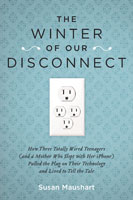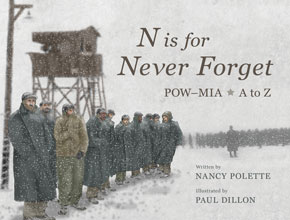Susan Maushart shut off the electricity, removed computer and television screens from the house, stored the video games, hid the mobile devices of her three teenaged children, and reluctantly stashed her beloved iPhone…for six months. She purposefully silenced all electronics, not because her children had done anything wrong, nor because she was a bored 50-year-old single mother. No, Maushart pulled the plug on modern technology because Henry David Thoreau, among other writers, inspired her to do it. In Walden, Thoreau challenges readers to adopt simplicity, and after noticing the polarizing complexity of a technology-saturated home with three teens, Maushart knew she simply had to do something.
It is not the first time Maushart has been spurred into writing action because of an issue she considers personally and passionately important. A well-respected columnist and social commentator, Maushart has made a career of tackling big topics with intense research and sometimes controversial writing. The living and writing of her book The Winter of Our Disconnect was no different. Her children balked, her children’s friends offered confused sympathy, and Maushart’s peers could hardly believe she was willing to subject herself to a teen-filled-tech-free home for so long.
 “I want to start a conversation about something that is waiting in the wings to happen or hasn’t happened yet,” Maushart says. “I want people to say about me when I’m gone, ‘she started arguments.’”
“I want to start a conversation about something that is waiting in the wings to happen or hasn’t happened yet,” Maushart says. “I want people to say about me when I’m gone, ‘she started arguments.’”
So in 2008, and without the legal option to abandon her children so she could run off to the woods like Thoreau, Maushart, a journalist with a PhD in Media Ecology decided to conduct the only version of the experiment she possibly could. She set out to create a figurative and virtual island for her family.
Because she and her children lived in Perth, Australia, at the time, and Maushart had never truly considered it home, unplugging meant she made a conscious decision to cut herself off from the daily coverage of her hometown newspaper, The New York Times. It was a choice to block the glorious ping of the email updates that kept her connected to the world and people she did consider home. She had suppositions about what her house would be like void of cords and buzzing, and that was part of what motivated her.
“The whole point of The Experiment,” she writes in her book, “was to send the Digital Natives on an extended trip abroad. A sort of family holiday back to the Old Country. An immersion experience, if you will, in the culture of their forebears.” Similar to Barry Marshall who, she explains, is an Australian scientist who swallowed bacteria to test a theory, Maushart was interested in a living experiment that could test the connectivity of her family. By pulling the plug on everything that drew them away from one another, she hoped they would find grounding in places that were not online.
For the first two weeks of her six-month-long experiment, Maushart turned off all electricity. She and her children ate by candlelight or flashlight, washed their clothes in the tub, and were forced to employ creative cooking because they couldn’t use an electric stove. She assumed the cold-turkey approach would help them appreciate the electronics they were going to be allowed to use for the duration of The Experiment. Her youngest, Sussy, abandoned the initial days of discomfort, noting she needed to spend more time with her father. She did eventually come back home, accepting the terms of The Experiment.
No cell phones, no ipods, no computers, no video games, and no television. One landline phone could be shared, and otherwise they would have to do their homework, or any other work that required a computer, outside of their home. That included the work of Maushart, a professional writer. Without the conveniences of technology, she was forced to resort to long-hand composition of her weekly columns and her research became handcuffed to the books and resources available at her local library.
So what else happened in the forced silence of a house full of teens? Boredom initially, and then eventually creativity began to bud.
Her children found they could indeed engage in face-to-face conversation. Her youngest daughter told her mom in a midterm debriefing interview “It’s like, ‘There’re people in the house…Let’s talk to them!’”
The family talked more, Annie cooked more, Bill played his jazz music more, Sussy studied more, and Maushart observes, “The most gratifying aspect of the experiment was seeing my children opening up a book and diving in.”
Partly out of necessity and partly out of boredom, her children began to engage deeper. Her son read through the entire Harry Potter series and then moved on to Haruki Murakami’s Kafka on the Shore. In the midterm interview Maushart had this exchange with her youngest (S):
“S: I’m reading way more, and faster…
Q: Yeah, but you’ve always been a reader.
S: Yeah, but I’m reading more intense books now, and bigger ones.”
Maushart acknowledges her children are an extremely literate bunch. Actually, she contends that this tech-saturated generation is more literate than ever.
“Lives are more text-drenched now than in any period in human history,” she says, “Children can spend literally hours arguing over the import of punctuation,” she says, referring to the toggling that occurs over the meaning of a text-message. She believes that if people care that much about punctuation, they must be highly literate.
There is a distinction, she concedes, between social reading and the deep, analytical reading necessary to digest complex writing. She enjoyed watching her children discover this deeper sort of word consumption.
She watched them embrace the drive “to finish books,” she says. “To start reading slower and slower just so not to finish, or longing to go to bed just so they could get back to what they were reading.” It was a welcomed side-effect of the unplugged experiment.
“I wish I could say it was a lesson learned for all time,” Maushart says. At the conclusion of the disconnect, and when electronics sprung back to life in their home, the kids quickly returned to their devices. “I wish I had more prescience at an earlier stage in my kids’ lives,” she says. She thinks they would be able to stay more unplugged if she had made it a forced part of their routine starting from when they were younger.
Maushart doesn’t blame herself, or other parents who became so quickly inundated with the advent of technology. “There hasn’t been a moment to stand back to assess unintended consequences. It came too fast, and we have gone for it hook, line, and sinker.”
There was a time, before kids, when Maushart wanted to get rid of the television altogether. “I wish I had stuck with the courage of my convictions,” she says. She believes if she had been more intentional, her kids would be more apt to take part in activities that do not completely involve electronics. The Experiment, and her book, demonstrate the possibilities of life without devices, and it is a response to the conversation started by Thoreau in 1844.
Thoreau wrote, “I went to the woods because I wished to live deliberately, to front only the essential facts of life, and see if I could not learn what it had to teach, and not, when I came to die, discover that I had not lived.”
Maushart quieted her home because she hoped to embrace life as simply as she could. She wanted to discover for herself, as well as offer discovery for her children, about what a simpler life could teach them.
Taking on a challenge to live simply may not be a comfortable decision, but it is certainly a deliberate one, and Maushart believes, “We need to be deliberate about the way we live our lives. We can’t sleepwalk.”
And sometimes the loudest wake-up call comes when there are no plugged-in alarms.
Web: www.susanmaushart.com
Twitter: @maustash Twitter.com/maustash
Buy: The Winter of Our Disconnect
Susan Maushart’s previous book projects have produced similar reactions. Check out:
Wifework: What Marriage Really Means for Women
The Mask of Motherhood: How Becoming a Mother Changes Our Lives and Why We Never Talk About It
What Women Want Next
Feature photo by Randee Daddona











